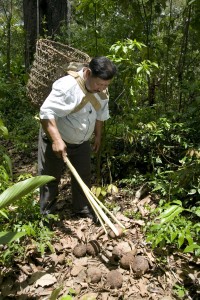











On #NationalNutDay we’re delighted to have a guest blog from Helen Long, campaigner and workshop leader with Liberation Nuts:
“Despite the name, the journey of a Brazil nut begins in Bolivia…

Juan Roca going to the forest to collect the Brazil nuts in Londres, Pando Region, Bolivia.
Photo: Eduardo Martino
Gatherers forage the nuts from deep in the Amazon rainforest. They go on collection camping trips for days or weeks at a time, braving: jaguars, electric eels, piranhas, vipers, vampire bats… and the threat of a nut falling on their head. These nuts are in fact seeds, which grow in pods the size of a coconut or grapefruit. Each pod can contain up to 25 of the Brazil nuts we see in the shops. Brazil nut shells are so hard that humans need a machete to crack them.
Gatherers get a better cut… when selling through Liberation nuts. After all their hard work gatherers deserve a fair share of profits and a stake in decisions. This is why Liberation, the UK’s only Fairtrade nut company, is owned by farming cooperatives. As well as Brazil nuts, Liberation produces: peanuts, cashew nuts and macadamias. Today is National Nut Day; and Liberation marks the occasion with the release of a film which follows the Brazil nut.
Brazil nuts are gathered because they cannot be farmed. They like to live in their natural rainforest habitat. Here, the trees can live up to 1100 years old, and grow up to 50m tall. In other words they may have started life at the time of the Anglo Saxons, and reach the size of the Angel of the North. These tree-mendous giants work in partnership with their smaller neighbours.
There is only one animal adapted to open the Brazil nut pods, the agouti. This is a rodent like a rat, but about the size of a cat. They open the pods with their razor-sharp teeth, eating some nuts and burying others for later like a squirrel. Brazil nut trees depend on the agouti to procure and plant their seeds.
Other animals such as porcupines dig up and eat the nuts agoutis have hidden away. Left over shells can fill with rainwater and provide a home to poison arrow tadpoles. Another animal, the human, clears paths through the forest. It has been observed that more young Brazil nut saplings grow along such paths. Perhaps the paths let light reach the forest floor, so that nuts gatherers have dropped can photosynthesise.
The humans, other animals and plants of the Amazon are bound together in interdependent relationships, which benefit us animals as far away as the UK. Fairtrade companies try to work symbiotically too, by making honest business agreements which recognise everyone’s contribution.
Global learning such as the fairandfunky One World Week conference is vital to Fairtrade, because it reminds us that we are all global citizens, connected ecologically and economically. Thanks a brazillion to fairandfunky for inviting Liberation to your conference; and tree top marks to all the students and teachers who contributed.”
Happy #NationalNutDay everyone! GO NUTS for Fairtrade!